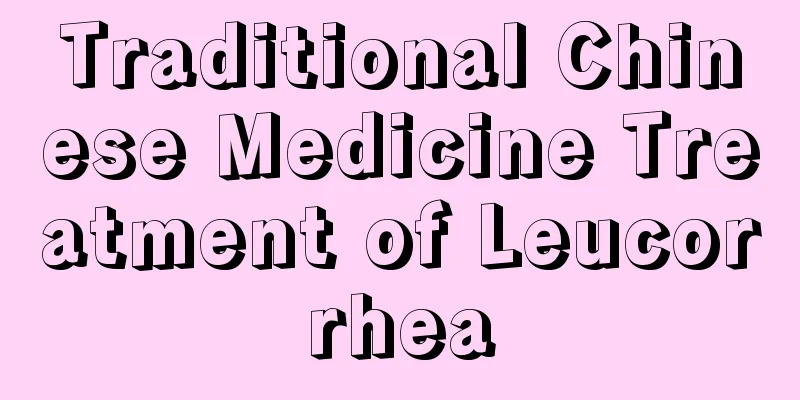Traditional Chinese Medicine Treatment of Leucorrhea

|
Leucorrhea is a relatively common gynecological disease. This disease is generally caused by vaginal inflammation and requires us to treat leucorrhea. Traditional Chinese medicines for treating leucorrhea include wolfberry, aloe vera and angelica. These medicinal materials are mainly for conditioning, and can also nourish the liver and kidneys and beautify the skin. Therefore, for patients with leucorrhea, in addition to adhering to drug treatment, they also need to pay attention to vaginal hygiene. 1. Commonly used Chinese medicines for gynecological leucorrhea Wolfberry Lycium barbarum is the earliest recorded gynecological medicine. It is sweet and flat in nature. It enters the liver and kidney meridians, nourishes the liver and kidneys, improves sperm quality and improves eyesight. It can be used for dietary conditioning for patients with liver and kidney yin deficiency. Experiments have shown that wolfberry fruits and leaves have a significant inhibitory effect on cervical cancer cells. Aloe Vera Aloe vera is a product that many women are very familiar with. It can beautify and nourish the skin. At the same time, it is also a good medicinal material that can be used to treat constipation and female amenorrhea. Angelica Angelica sinensis has been a precious blood tonic since ancient times. It can nourish blood and promote blood circulation, regulate menstruation and relieve pain, moisten the intestines and promote bowel movements, and promote tissue regeneration and strengthening the body. It is very suitable for women with weak constitutions and plays an irreplaceable role in gynecology. Astragalus Astragalus can replenish the middle and benefit the Qi, and has obvious therapeutic effects on all symptoms of Qi deficiency and blood deficiency. At the same time, it can help women's skin increase its antibacterial ability and prevent hair loss. Chuanxiong Ligusticum chuanxiong is pungent in taste and warm in nature; it enters the liver, gallbladder and heart meridians. It has the effects of promoting blood circulation and qi, dispelling wind and relieving pain, etc. It is mainly used to treat dysmenorrhea, amenorrhea, dystocia, postpartum lochia, abdominal pain, lumps and other gynecological diseases. White Peony Root White peony root is a blood-tonifying herb in traditional Chinese medicine. It is bitter, sour, slightly cold in nature and enters the liver and spleen meridians. It can be used to regulate health for symptoms such as blood deficiency, irregular menstruation, dysmenorrhea, metrorrhagia, accompanied by dizziness, fatigue, palpitations and insomnia. 2. Traditional Chinese medicine prescriptions for gynecological leucorrhea Sophora flavescens decoction, main ingredients: Atractylodes lancea, Phellodendron chinense, Sophora flavescens, Paojia, etc. Properties and indications: dispel wind and dampness, kill insects and relieve itching. Used to treat fungal or trichomonal vulvitis, vaginitis, cervicitis, chronic pelvic inflammatory disease, etc. Heat-clearing and detoxifying soup, the main ingredients are: Angelica dahurica, Cyperus rotundus, Phellodendron chinense, Taraxacum mongolicum, Honeysuckle, Houttuynia cordata, etc. Performance and indications: Clearing away heat and detoxifying, promoting blood circulation and removing blood stasis. Used to treat various types of vaginitis, cervicitis, and chronic pelvic inflammatory disease. Symptoms include pain and heaviness in the lower abdomen, soreness in the lumbar spine; or heavy menstrual bleeding, increased leucorrhea, yellow color, smelly, and distending pain in the breasts. Generally, taking it orally for 10 to 30 times can cure the disease. The above treatments for gynecological inflammation are very effective and patients can try them. 3. External treatment of gynecological leucorrhea The main treatments for leucorrhea are to eliminate evil, detoxify and kill parasites. The methods include external washing with Chinese medicine, fumigation and washing with Chinese medicine, and inhalation of Chinese medicine. Chinese medicine for external washing: 20g each of Cnidium monnieri, Stemona tuber, Radix scutellariae, Sichuan pepper and Alum, boil them into a concentrated decoction and then use it to fumigate and wash the affected area. Suitable for those with frequent vaginal itching. Fumigation with Chinese medicine: Cnidium monnieri powder (20g each of Cnidium monnieri, Sichuan pepper, alum, Sophora flavescens, and Stemona bulbs) is used to fumigate the affected area for about 5 minutes, followed by a sitz bath. Suitable for those with excessive and severe itching from vaginal discharge. For those with genital ulcers, Sichuan pepper should be removed. 3. Chinese medicine: 15g each of Sanguisorba officinalis, Stemona bulbus, Coptis chinensis, and Platycodon grandiflorum, decoct into concentrated juice, wrap cotton with gauze, soak it in the juice and insert it into the vagina. Suitable for excessive vaginal discharge caused by damp heat. |
>>: How long does it take to have a baby after taking the medicine?
Recommend
How to clean breasts if you have inverted nipples?
Breasts are one of the important parts of women, ...
Can I eat venison during menstruation?
There are many types of food. When choosing some ...
Long Johns Calling! Will Not Wearing Long Johns Cause Arthritis? The Truth Is…
The cold wave has been coming in force in recent ...
Is the late menstrual period the ovulation period?
We all know that women have a menstrual cycle eve...
Why are contractions more severe at night?
Uterine contractions are a physiological phenomen...
Can small lung nodules turn into cancer?
I believe that some people or patients' famil...
Long time squatting on toilet during early pregnancy
Pregnancy is a very difficult and wonderful thing...
What are the symptoms of acute vulvar ulcer?
In today's society, the incidence of gynecolo...
How to cut mango for easy eating? What kind of food can be made from mango?
Mangoes are oval and smooth, with delicate flesh a...
What are the main symptoms of uterine cold?
In order to have normal childbirth, protective me...
How to choose soft-seeded pomegranates? Are soft-seeded pomegranates genetically modified?
Soft-seeded pomegranate is a new variety of pomeg...
Diet for losing 15 pounds in a week during menstruation
In fact, if you know how to arrange your activiti...
Can I get the nine-valent vaccine during the epidemic? What should I do if I can't get the nine-valent vaccine during the epidemic?
We all know that the nine-valent vaccine is a pop...
Pelvic effusion 1.2
Pelvic effusion is a particularly common phenomen...









